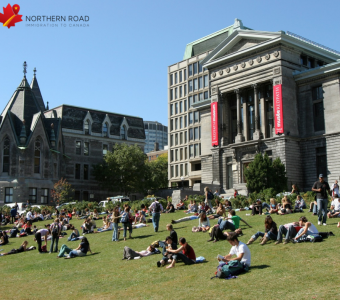
As a Vietnamese international student studying in Canada, you can expect that the cost of living will significantly increase compared to living in Vietnam.
Although this is true, we have great news for you! The cost of studying in Canada is considerably cheaper than any other G7 country! So not only is the cost of studying markedly more reasonable, but the cost of living is also much more affordable than in other countries.
To make the most out of your study abroad experience, we’ve compiled a list of the best ways to keep your expenses down and save money where you can while studying in Canada.
1. Apply for Scholarships to Study in Canada.
The good news for Vietnamese international students looking to study in Canada is that there are many scholarship options available! Scholarships to study in Canada come in different forms, and it’s essential to know all your options.
Tip: Many international students who study in Canada are not aware that there are a total of 11 types of scholarships available! Applying for these scholarships to study in Canada is definitely worth the effort, considering many students are unaware of all the available options.
The way scholarships to study in Canada are awarded can be a bit confusing. To make sense of all the options of financial support available, we recommend the Canadian company ApplyBoard to support you in finding your dream educational program and find the right scholarships to study in Canada.
2. Purchase University Coursebooks Second-Hand

Depending on your chosen program, the cost of course books can go upwards of CAD $1,000 per semester. Y With all the excitement of preparing to move abroad, arriving, and getting used to your new environment, university coursebooks are often overlooked as an expense. They can quickly increase your costs of studying in Canada.
Luckily, there is no need to purchase all our coursebooks brand new. Many other international students finishing up their studies in Canada often sell their coursebooks to incoming students for over half the price of purchasing a brand new coursebook.
Those CAD $1,000.00 brand new coursebooks can now easily be obtained for CAD $350.00. Often the city you choose to study in will have Facebook groups that sell second-hand books. Going this route will significantly reduce your costs of studying in Canada.
Alternatively, if you wish not to have your own coursebooks, most universities in Canada offer rental options to students. Although rental books might not be in mint condition, going this route can save you thousands of dollars over the years while studying in Canada.
Lastly, if you don’t mind not having a hard copy coursebook in hand, all universities in Canada will offer digital copies, which sometimes will have little to no cost.
3. Apply for a Job
While you are studying in Canada, the Canadian government permits students to work while they study. While holding a valid student visa, students are allowed to work off-campus upwards to 20 hours a week during school terms and full-time during scheduled school breaks. If students choose to work on-campus, they have no time limit for the number of hours that can be worked.
Depending on the province of residence, the hourly minimum wage starts at CAD $11.75 – $15.20. As a result, most students opt into working part-time, as it’s an effective way to reduce the cost of living while studying in Canada.
Not only is this a great option while studying in Canada, but it also provides students the chance to enter the Canadian labor market and gain invaluable work experience.
Upon graduation, students can apply for a Post Graduate Work Permit that can be valid for up to 3 years. Once an international student has worked in Canada for a period of 12 months in a skilled job, students may then qualify for permanent residence under the Canadian Experience Class.
Provided international students are given the opportunity to qualify for permanent residence in Canada after graduation, so many international students choose to study in Canada for this reason.
4. Accommodations Options
Where you choose to study in Canada will determine your total cost of accommodations. While not all cities are expensive, it is still a good idea to factor in your accommodation costs.
There are three accommodation options that international students can choose from when studying in Canada.
- Privately renting an apartment or complex.
- School dormitories
- Homestays
For the purpose of money-saving tips and lowering your costs of studying in Canada, we suggest the following options:
School Dormitories

School dormitories are great options for students looking to make friends and settle into their new lives in Canada. Dormitories are owned and managed by the university in Canada and often come with basic furnishings such as beds, bathrooms, and a small kitchen.
Not only is this is a great option to lower your expense and save money while studying in Canada, choosing to live in school dormitories will allow students to quickly make friends with other international students who have also recently arrived in Canada.
This accommodation option is also great if you plan to be involved in activities happening around campus, such as sports teams or other recreational activities. Making it easy to go to and from activities without spending money on transportation will greatly help reduce your costs while studying in Canada.
Homestays
Choosing to stay in a homestay while studying in Canada is a fantastic option to dive deep and learn about Canadian culture. Homestays are Canadian families that welcome international students to stay with them throughout the study period.
Families are usually contracted by universities in Canada to support their welcoming and life in Canada. To ensure safety, all families must undergo a series of checks and verifications that members of the household do not have criminal records and can provide a safe and secure environment for students while studying in Canada.
We recommend this option if you would like to quickly advance in your language abilities. Choosing to stay with a friendly Canadian family will promptly help students sound like native speakers in no time! Not only that, homestay families are always there to support international students with any questions or concerns during their time studying in Canada.
What’s best about this option? Universities in Canada usually match international students with families that have similar interests, locations, and types of amenities. All homestays receive fully furnished rooms, Canadian home-cooked meals and are always invited and encouraged to join the family activities.
To help understand and manage your costs of studying in Canada, we have researched accommodation options and average pricing based on Canadian provinces that can be seen in the table below.
[insert table]
5. Take Advantage of All the Great Student Discounts

Financially speaking, there is an abundance of perks of being a student studying in Canada!
Discounts are so great that we often wish we could be students again to take advantage of them.
Student Price Card
When purchasing a measly CAD $10.00 Student Price Card, also known as SPC Card, students will have access to discounts and deals on fashion, food, shoes, accessories, travel, and more. The SPC card provides students upwards of 30% off on over 450 brands across Canada!
Some of your favorite brands like:
- Apple
- H&M
- Samsung
- Adidas
- Burger King
- Pizza Hut
- Booking.com
And much more! Once you receive your student card, you can purchase an SPC Card online to access all these great deals. Alternatively, most universities in Canada will also sell them on campus.
ISIC Canada
Also known as International Student Identity Card, provide international students additional discount in Canada and internationally.
ISIC Canada issues a yearly CAD $20.00 fee, which grants students many savings on Canadian brands, alongside other international offers.
We highly suggest checking them out to save some money on school items to reduce your costs of studying in Canada.
Cell Phone Plans
To stay in touch with your loved ones, it’s essential to stay connected! Canada offers many international student cell phone plans that significantly reduce your overall costs of studying in Canada.
You can choose to opt for a yearly plan or pay as you go. Many phone companies operate in Canada allow maximum flexibility and price competitiveness. If you choose a yearly locked-in plan, you may qualify to have a brand new phone given to you. Your monthly plan will cost more than other pay-as-you-go services but at least you do not have to pay for the new device upfront. If you wish to use the other non-locked-in services, you can use your own device and input the new SIM card directly, and be connected right away.
For cost-saving purposes, we recommend using smaller cell phone companies like Koodo and Virgin. If you require a more extensive cell phone plan and don’t mind the higher fees, we suggest Bell or Telus.
Be sure to mention you are a student studying in Canada! Otherwise, you might just miss out on the available student plans.
6. Apply for an International Student Bank Account and Credit Card

Saving on international money transfers as an international student studying in Canada should be one of your top priorities! Exchanging money between you and your family here in Vietnam can become expensive without the right financial partner.
Our personal recommendation for Vietnamese students studying in Canada is to open up an account with Scotiabank. Their unlimited no-fee international money transfers are ideal for both parents and students when embarking on a journey to study in Canada. We as Canadian living here in Vietnam also choose to use Scotiabank for this exact reason.
Additionally, Canada offers student credit cards, and while they help save money, it is also important to remember that owning a credit card requires being responsible.
In Canada, any purchases made on a credit card throughout the month must be paid back within 30 days if you do not want to incur interest charges. If you decide to pay the minimum balance, you will be charged interest that is on average around 20%.
7. Save Money on Travel
No matter the city you choose to study in, Canada provides student rates for inner-city and inter-city public transportation. Depending on where you decide to study in Canada, these discounted monthly passes cover public transportation like buses, subways, trains, and light trains.
Depending on the city and province of residence, student passes start at CAD $75.00 a month or even more discounted prices if purchased for an entire school semester. Transportation passes can be bought in large retail shops or can be purchased directly from universities in Canada.
8. Cooking at Home

Unlike the luxury of being able to walk outside and purchase a nice bowl of cheap phở bò or bún thịt nướng, Canada, on the other hand, does not have the same luxury of ready-cooked meals at affordable prices.
Therefore, we recommend cooking at home, as it will be far cheaper than going out to a restaurant or ordering food delivery.
For instance:
The cost of a basic meal at a non-expensive Vietnamese restaurant in Canada ranges anywhere from CAD $12.00 – $20.00 per person! That means you can make at LEAST make 20 portions of bún thịt nướng at home if you take it upon yourself to do the cooking.
Not only does cooking at home significantly reduce your overall costs, cooking at home provides an excellent opportunity to learn other cultural dishes from the hundreds of nationalities that come to study in Canada. Perhaps in no time, you will learn how to make a proper Italian pizza from your Italian roommate, or bake a French baguette from a fellow French classmate. In exchange, we’re sure your international friends wouldn’t mind trying some of your secret family Vietnamese recipes!
One other tip to save big on food costs is checking weekly flyers from grocery store chains. They always have coupons or specific items on special. You can opt to subscribe to their email list to receive the coupons and discounts right on your phone.
While studying in Canada, food can quickly become your most significant expense if you decide to eat out regularly. From this entire list, we believe this tip is the biggest one to consider to save money as an international student.
9. Create a Budget and Track Your Spendings
We’re not going to say budgeting is easy because it isn’t! Especially when living and studying abroad in a foreign country, you will have a new currency to learn, remember exchange rates, and understanding what is considered affordable and unaffordable for Canadian standards can quickly make your head spin.
A few basic rules we recommend to make budgeting easier include:
- Tracking your weekly and monthly income. Once you know how much you spend each month, it will be easier to track your budget for an entire semester at a time. Doing so will significantly help identify and lower your costs of studying in Canada.
- Categorizing your spendings. Calculating how much you spend on food, travel, rent, utilities, and weekly outings will provide you with a sense of where you could be overspending. At the end of the month, you notice you spent CAD $150.00 takeout delivery pizza; it’s a good indicator of where to begin cutting lousy spending habits.
- Being honest with yourself and your necessary expenses. Did you really need the CAD $150.00 on takeout delivery pizza last month? Most likely not. Remember there are other costs like rent, transportation, school fees, and books that all account for your total cost of studying in Canada that are more important.
If you haven’t already heard of the Vietnamese fintech app Money Lover, we have found this app incredibly helpful as Canadians living here in Vietnam. The app is great to help manage exchange rates, multiple currency spendings and help manage and track personal expenses without going over personal budget.
As an international student studying in Canada, finding ways to easily manage and plan your personal finances will make your experience living abroad much more enjoyable without the need to worry about counting each last penny.
10. Take Advantage of Second-Hand Stores

Taking advantage of second-hand stores to purchase household items, accessories and clothes can help save you big. If you’re big into fashion, the thrift store is a jackpot full of surprises! You can quickly expect to walk out of the store with two pairs of original Guess jeans for CAD $45.00; whereas had you gone to purchase brand new from the retailer, the same two pairs of jeans would have cost over CAD $800.00!
While studying in Canada, you will quickly come to learn that many Canadians love going to thrift stores. Especially when it comes to seasons like Halloween, Christmas, or Tết holiday in Canada. These stores quickly become one of the favorite places to shop for great deals throughout the year.
If you’re ready to start your new adventure and apply for your student visa to Canada. Let us accompany you in your journey to making your dreams to study in Canada become a reality!
Ignite your dreams. Go further!








